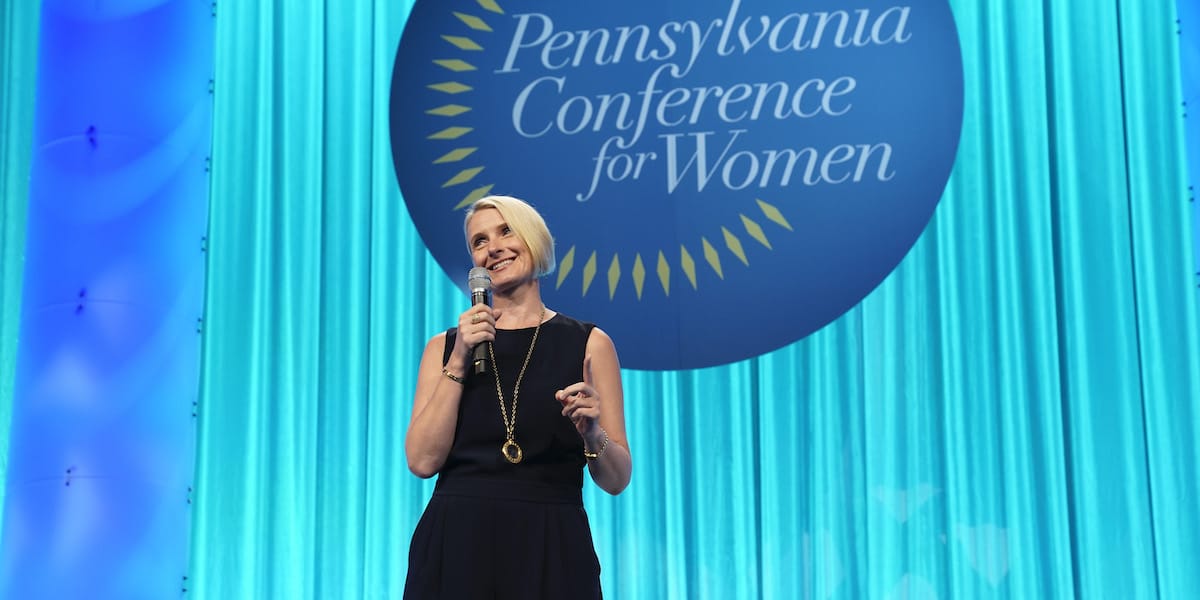Elizabeth Gilbert: On the Three Most Powerful Words a Woman Can Say

When she was 25 and had moved to New York City to pursue a career as a writer, Elizabeth Gilbert saw a woman in her neighborhood who seemed to be living her dream life: one of creativity that was not taken up by other day jobs.
“She became my mentor. She didn’t know. We didn’t have the conversation. I just decided. And, what that meant in my world was that I would semi-talk to her,” Gilbert told 10,000 women at the 2019 Pennsylvania Conference for Women. “My plan for this mentorship relationship was to be in her presence and what would happen is all that [she had] would migrate to me.”
Then, one night, Gilbert saw her at a party, where the woman politely asked how her writing was going. Gilbert responded: not very well. The woman asked why. Gilbert said she had too much work, and was busy with a boyfriend, and her roommates were very distracting. In short, she didn’t have time, and she didn’t have privacy.
“At the end, she asked me the single most important question anybody has ever asked me in my entire life. I can honestly tell you my life hinged on that question,” Gilbert recalled. It was: “What are you willing to give up to have the life you keep pretending you want?”
Gilbert felt offended and immediately defended herself. But the woman challenged her, saying that from her perspective it looked like Gilbert put time into everything except the writing that she said was most important to her.
Then she asked where her free time was spent. Gilbert responded that she didn’t have any. “Really?” the woman asked. “What’s your favorite television show?” Gilbert answered Seinfeld. Then the woman similarly challenged her about her favorite magazines and restaurants and bars.
Finally, knowing Gilbert and her friends had plans to go the beach for a week, the woman said: “You are not going because if you do go, then I don’t ever want to have this conversation with you again about how your work isn’t going well because the thing you care about you don’t have time for.”
Gilbert acknowledged that she had to learn to say “no” to things she didn’t want to do. The woman said, “Oh, honey, it’s so much worse than that. You have to learn to say ‘no’ to the things that you do want to do with the understanding that you just have this one life stream, this one energy source, this one brief moment here.”
That, said Gilbert, became the turning point in her life as a writer. She stayed home and wrote what would become her first book.
The upshot: “Women are taught they are supposed to care about everything and everybody equally; and it is a lie, a great lie that is keeping you in bondage,” Gilbert said. “The reason I think you are so worried, tired, and stressed,” Gilbert said to the audience, “is because you believe this great lie that you are supposed to care about everything and everybody equally.”
“My prayer,” she added, “is that you take that worry off your neck that you have been struggling with and turn it into a golden circle you put around you and your projects, and your creativity, around who and what you love. Say everything in the circle is now sacred. I choose what is in it. And, if you’re not in the circle you can what outside because I don’t care.”
Those three words, “I don’t care,” are the three most powerful words a woman can have in her arsenal, Gilbert suggested, because they allow us to focus our energy on what we do most care about.
The Magic of Liz Gilbert
People know Elizabeth Gilbert best as the author of the wildly successful international bestseller, Eat, Pray, Love that was made into a movie starring Julia Roberts. It gave voice to women who longed for something more. More from relationships. More from love. More from life. She inspired us to pursue our dreams wherever they take us.
Since then, Gilbert has continued to dazzle us time and again. Her wondrous book, Big Magic, has led countless women to recognize that there are “extraordinary treasures” that long to be coaxed out of every one of us.
Then, just this past summer, Liz Gilbert returned to her roots as a fiction writer with the release of City of Girls, an instant New York Times bestseller. Set in the theater world of the 1940s, it’s a spellbinding novel of glamour, sex, and adventure, about a young woman discovering – you’ll like this: that you don’t have to be a good girl to be a good person. But perhaps most importantly, she inspires joy and wonder wherever she goes.